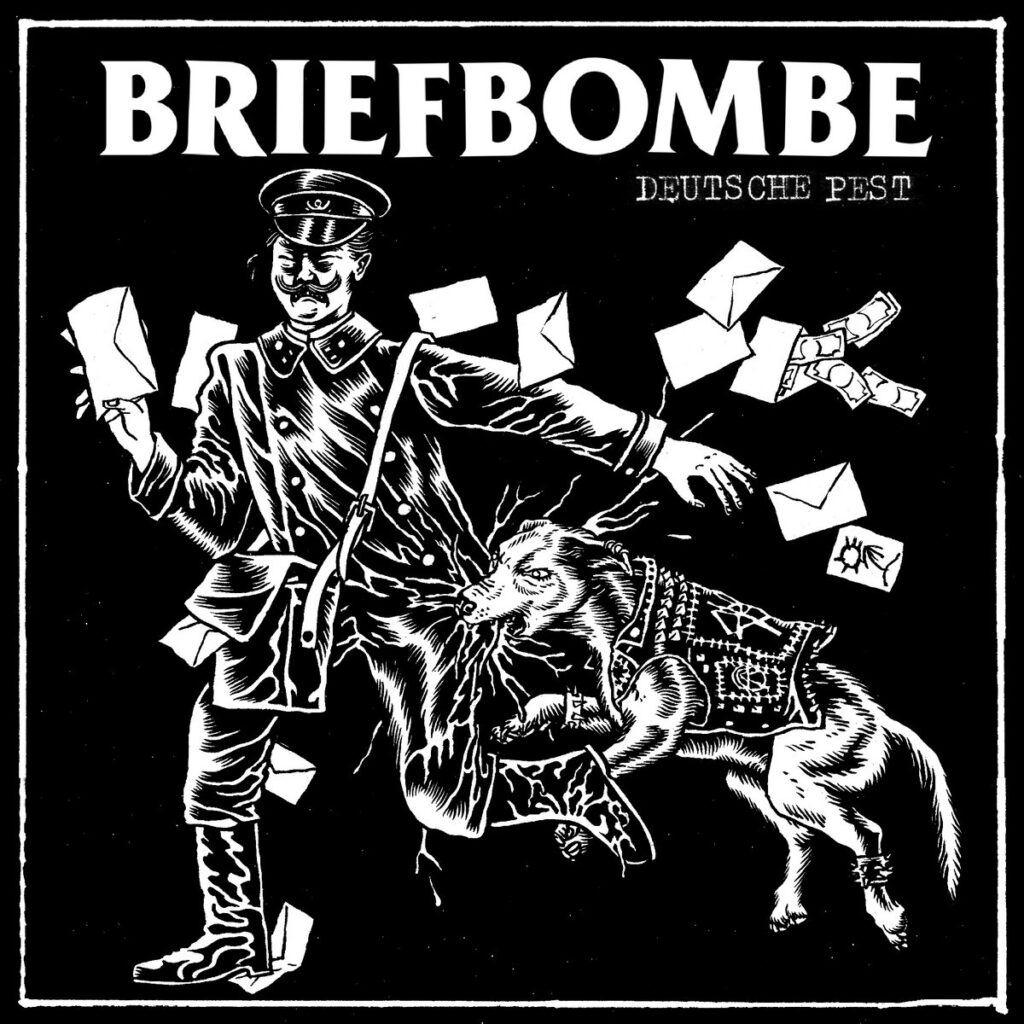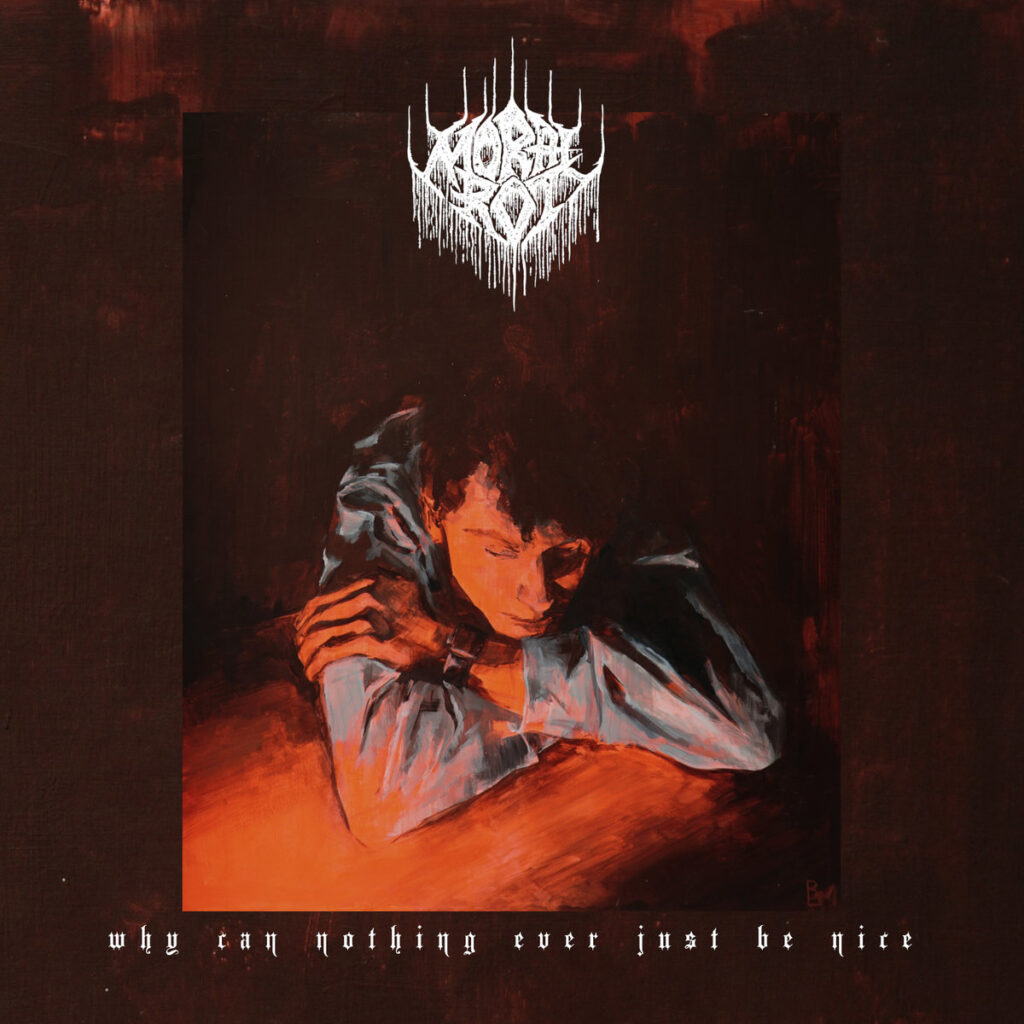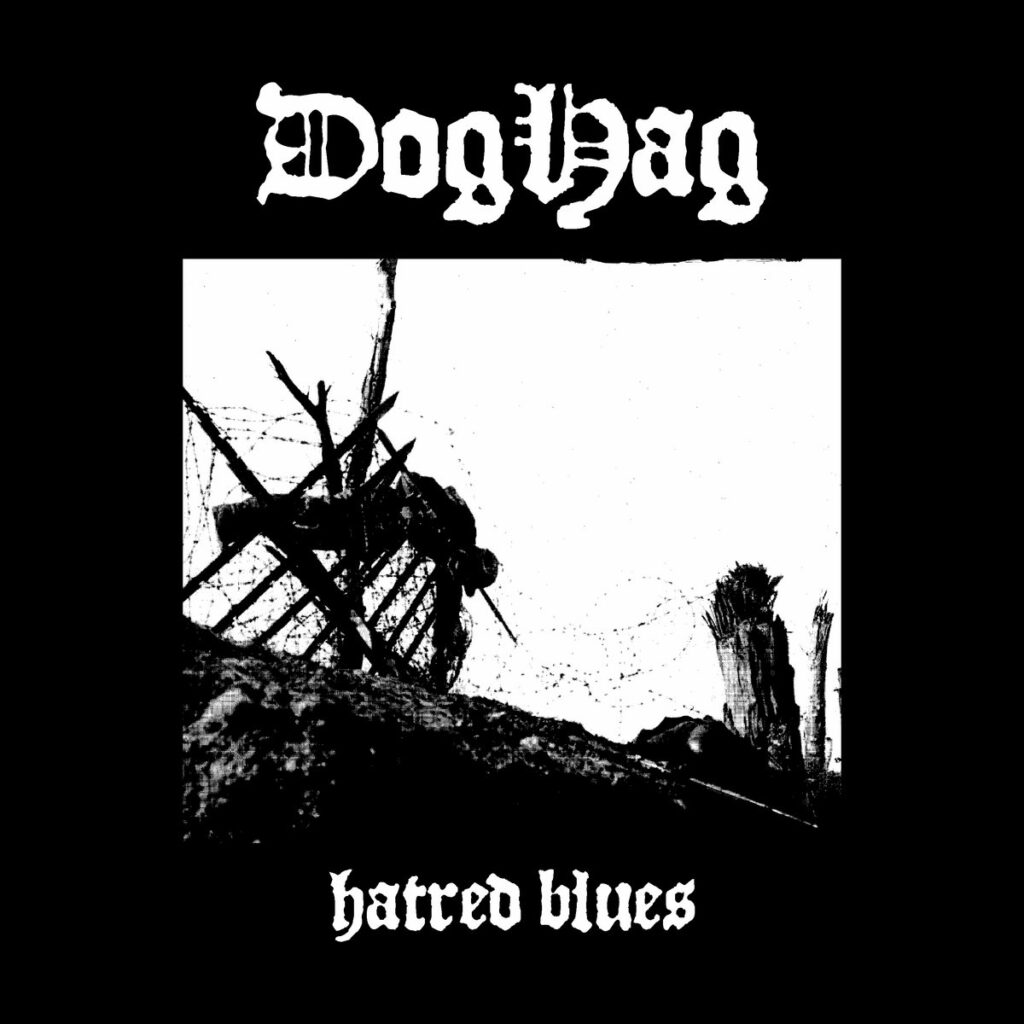| Band: | Haexler |
| Release: | Talkshow |
| Genre: | Powerviolence, Hardcore |
| Country: | Germany (Leipzig) |
| Release Date: | 26th of September, 2025 |
| Released via | Holy Goat Records Lower Class Kids Records |
Ever since the release of Haexler’s debut Blankness, Bleakness, I have been following this band. Especially when this debut release came out, I was in an absolute peak of listening to Powerviolence sound and when I came across Haexler, I got stuck entirely. Wage, Work was an intense follow-up that showed the band coming to terms with a more concise lyrical framework surrounding their releases. The energy that is present on these tracks is immsense and difficult to put into words. When the follow-up and third release was announced, I knew immediately that this will be something. Well, what can I say except the fact that expectations were superseded.
Since I thought that Haexler might need more than 8 minutes to convey the lyrical depth that stems from their third release Talkshow, we took some time to talk about the band, break down this release and some specific tracks precisely.
Interview with Haexler
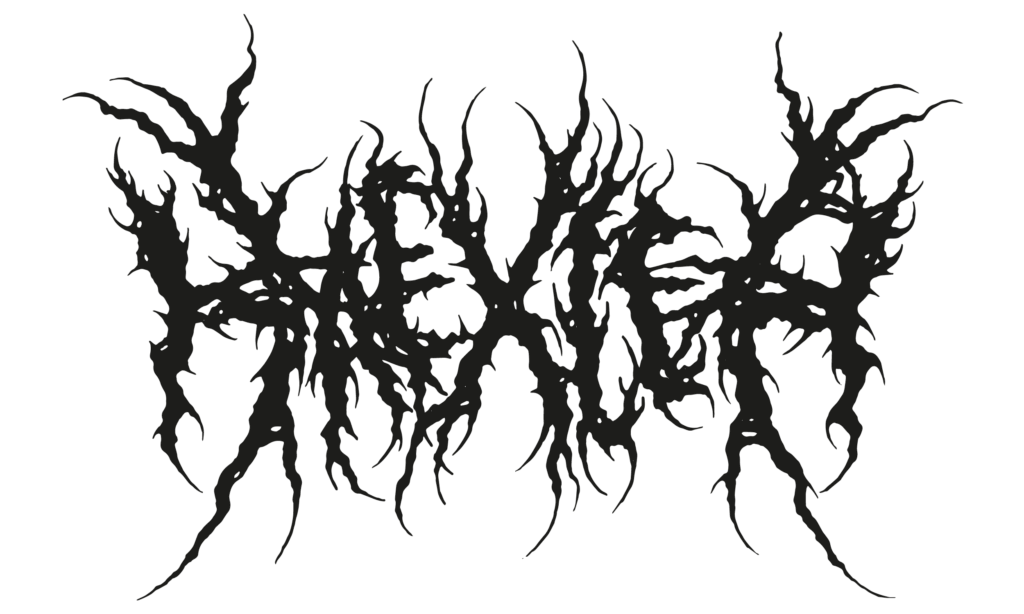
Hello Haexler! I’m very glad to have you over here at Transcended Music Blog. Having happened at this blog numerous times already, Haexler is no new name to us. Nevertheless, I still want to express gratitude for having you here. How are you doing lately? Already messing with pre-release energy?
Hey Roman! Thanks so much for having us – always a pleasure to be here.The Haexlers are doing fine! Release tension is definitely creeping in, but in a good way. We’ve poured a lot of energy into getting everything ready these past few months, so it feels a bit surreal that Talkshow is finally about to drop.
I know that you know that I know. However, I still wanna take some time to offer the opportunity to introduce yourselves. Who are you and is it possible that we might know some members of the Haexler crew from different projects?
Haexler is a powerviolence band from Leipzig, East Germany, that came together back in 2019. We’ve put out two EPs so far: Blankness, Bleakness in 2020 and Wage, Work in 2022. Our Talkshow EP will be released on September 26th.
We’re Daniel singing, Marv on guitar, Jules blasting, and Niels on bass. Each of us has a background playing in various bands and projects over the years, so chances are high that we’ve crossed paths in some Youth Center or House Project at some point.
Marv is playing punk-shows since over 30 years and Jules comes from the DIY-scene in Magdeburg. Daniel and Niels have been active in the rural area around Leipzig for the past decade.
You could have heard of Astro Ritter Kollektiv, Angstbreaker, Kaufaust, Flesia, 20 Liter Yoghurt, Rigid or Pagdalan for example.
All of us basically share their lives with DIY Hardcore Punk.
Going by the fact that some of your members have been involved in different projects already, it is always the question – what formed the original idea to come up with a new band? What was the overall impact that brought you together with the idea to form this specific Powerviolence band in the first place – do you still remember?
It was kind of a lucky coincidence since our paths had already crossed in different circles. We all ran into each other through various scenes and randomly started chatting about blast beats and Magrudergrind.
What we share here is a fascination for the raw energy, power and fun that comes with this kind of music while also having ties to radical politics. Bands like the aforementioned Magrudergrind and Harm Done – just to name two – really inspired us, and let us want to be part of that.
At a friend’s BBQ, where Marv and Jules met, they made the call to start a powerviolence band. The rest is history.
The introductory phase of your upcoming third EP Talkshow is already at full peak right now. How do you experience the current first encounters of your audience with your upcoming release?
Honestly, it always feels a bit weird for us to promote ourselves in this kind of usual way. In the end, we’re four friends who love messing around with fast music, being on the road, seeing new inspiring places and playing shows together. We sometimes need to realise all together where this already brought us and how many amazing and inspiring people or projects we were already happy to meet due to this band. This is what it is all about.
So it means a lot to us that people actually seem to care and are excited about us releasing these new eight minutes.
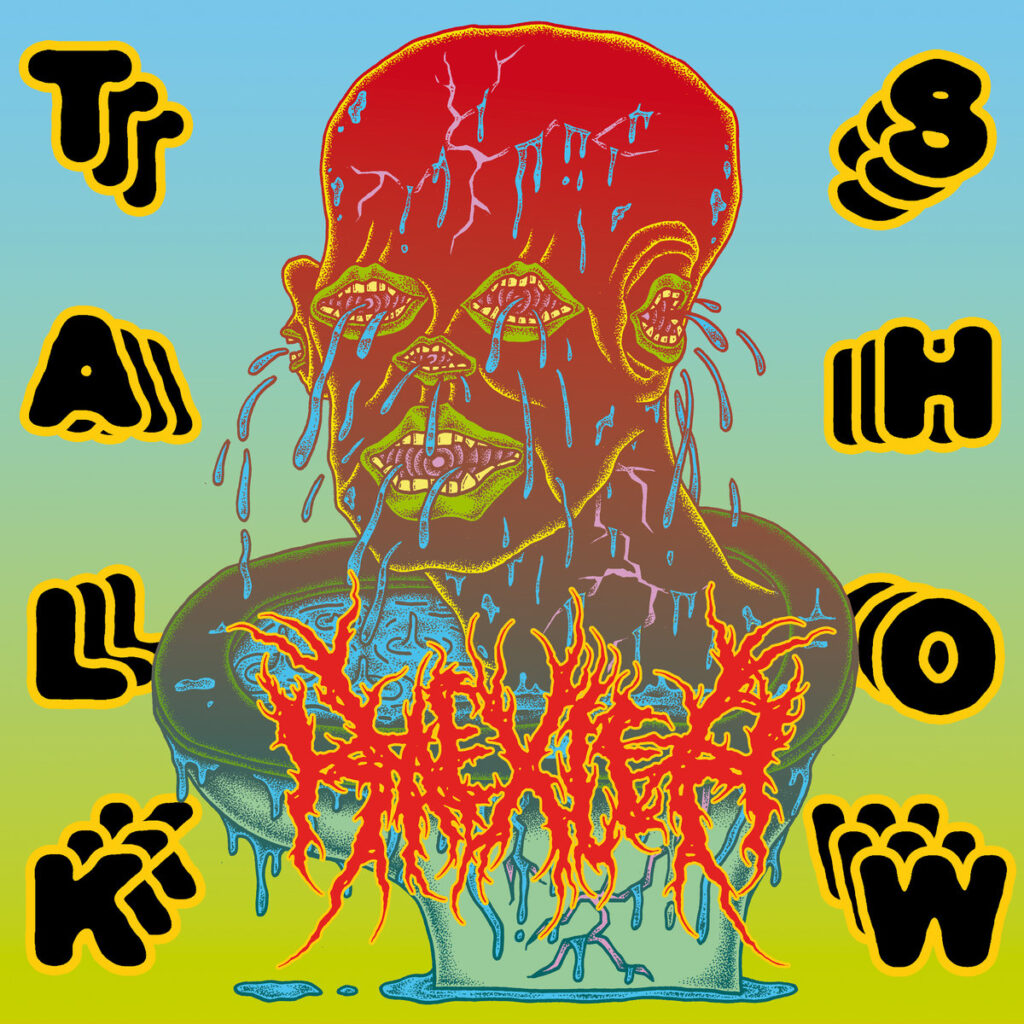
Anyone who has ever followed Haexler and their music is probably quite aware that the overall lyrical framework of the band as well as its entire theme revolves around political spheres. Was this omnipresent intention there right from the beginning when you formed Haexler and how did it come up?
In the beginning, we never talked about it explicitly, but since we all knew each other and had never made music that wasn’t political, it was probably clear where we were headed. On our first EP, we were still experimenting with a lot of things, and the lyrics are less conceptual and more about personal feelings. That changed when we became a bit more confident in what we were doing and wanted to explore the unique possibilities of the genre on a lyrical level as well.
Your former releases – especially Wage, Work – were classy full DIY EPs that found a release via a large number of different labels. When now taking a look at the labels involved releasing Talkshow, we can only find Holy Goat Records for vinyl duties and Lower Class Kids Records for tapes. What changed and how did you all get together?
It has always been a dream of ours to work with many different labels from different regions. The fact that it actually came together like that for Wage, Work still makes us incredibly happy to this day. We’re endlessly grateful to everyone involved for their effort and contribution. It would not be what it is without all these people. But as you can imagine, if you have to agree on everything with 15 people from different countries, it’s a lot to communicate and things take their time.
Now we’re moving on to Talkshow. We’ve known Nino from Lower Class Kids since our very first release, and he’s supported us every step of the way. Over the years, a real friendship has grown out of that, so it was never even a question — we knew right from the start that we wanted to do tapes with him again.
Ralf from Holy Goat Records was also part of the Wage, Work vinyl release. He came to see us at a show in Cologne around the time we slowly started talking about the new EP. We ended up spending a great evening together and — well — we probably fell a little in love with each other that night.
At some point, it just felt totally right to do the new record with him. There wasn’t really one big reason for focusing on just one label. After working with so many amazing labels before, we were maybe just ready to do it differently.
The foundation of this EP differs from the theme of Wage, Work. While your previous EP addressed global capitalism during times of industry 4.0, Talkshow now more directly discusses political frameworks within democracy. How exactly can we understand the scope that finds resonance on this release?
If you only give yourself 8 minutes and set out to work through ‘liberal democracy’ and its promises of salvation, as well as parliamentary conventions, you naturally have to make compromises – but we think that the spotlight concept worked very well on Wage, Work and wanted to apply it to more immediate topics. Some are very ‘on the nose’, others are probably controversial even within the scene. The staccato-like editing is intended to create a sense that all phenomena are interconnected and that there is little point in criticising only individual obvious symptoms.
One perfect instance to exemplify the music of Haexler was the track “Entrepreneurship” on Wage, Work that harshly pinned down a theme only within a little more than a minute. It can be quite difficult to convey these themes on tracks that always wander about on the 1-minute-mark. What is it like to deconstruct and didactically reduce these topics for your tracks?
It’s actually a very exciting challenge and completely different from how lyrics are usually written. Firstly, because, in a very anti-music-like way, the classic verse-chorus-bridge structure is completely abandoned. Secondly, because you inevitably have to reduce complex topics to keywords and still want to incorporate a bit of finesse here and there. Then it also has to fit the music somehow, which often means looking at how many syllables fit into which part. It’s actually like maths. But since keywords alone are not enough, we publish explanatory texts for each release, point them out at every show and invite people to come and talk to us about them.
When listening to your music, the profound depth of the lyrical themes are frequently overtaken by the immense energy of the sound. When you write this music, what impact do you intend to trigger on your audience – awareness of the calamity that is lyrically transported or blatant energy to reduce stress generated by these issues in the first place?
That’s a fantastic question, because we’ve never really talked about it before. Our starting point was to do something that we enjoy ourselves and that helps us deal with the catastrophic situation we find ourselves in. In a political subculture, it’s nice when our music and concerts give people an opportunity to balance and network, but we also encourage people at every show to engage with the content and organise politically, to come together. I think that for many people, it’s not a lack of awareness that prevents them from taking action, but rather complacency, hopelessness or repression. Which is understandable – but everything is easier when you’re not alone and have a sound knowledge of the connections between things that go beyond a mere sense of injustice.
And last but not least we are happy when people ask themselfs what the fuck happend during the last 20 minutes of my life when we finished our show.
The lyrical framework of Talkshow is inspired by the ideas of the classic “Die Transformation der Demokratie.” Although the immediate associations between the title of this book and the theme surrounding current issues of democracy are quite obvious first of all, I wanted to ask: how can we link Agnoli’s ideas with Talkshow in general?
It’s really hard to sum that up in a few short words, haha. The starting point was the observation that, given the ever-growing fascist threat in Germany, more and more people, including those who consider themselves radical leftists, are holding up ‘our democracy’ as an ideal worth protecting. Back in the 1960s, Agnoli had already shared some valuable thoughts on why this isn’t helpful and, on the contrary, how liberal democracy has provided fertile ground for current developments and does nothing to combat fascism. Outwardly, a multi-party system continues to exist. The parties differ in their programmes, names, traditions and milieus – in other words, in their ‘plurality’.
In reality, however – especially on the fundamental issues of property and the economic system – there are hardly any fundamental differences. All relevant parties operate within the same framework and ensure the stability of the system. The message is that everything can be decided democratically, but it is out of the question to ever discuss the property regime or the mode of production. This is the only thing that could ultimately lead to a just society and save us from climate catastrophe. The symptoms are discussed, but the causes remain untouched. By simulating parliamentary opposition, the system remains untouched.
I think one of my personal moments first having experienced the existence of a so-called political “back room” was when the negotiations regarding the TTIP treaty in 2013 took off. From that point on, I was made aware that these rather “unconventional” ways of coming to terms are way more frequent than actually expected. Was there any specific back room decision that served as the key issue for writing this song?
Not really! On the contrary, the aim was to illustrate that backroom politics is not the exception but the rule and is intended by the political system. And it’s not about the fact that parliamentary sessions are, of course, only to be understood as a theatre stage and that the real work happens in committees or similar, but that representatives of large corporations have completely different approaches to decision-making than citizens, and that all factions of the ‘pluralistic unity party’ are willing, when in doubt, to pull together for the so-called national good. And all too often, this also happens to be the good of the DAX board members.
The understanding of the term “civic” probably conveys quite a lot of different semantic approaches. What is it that you address when you treat the subject of “civic behavior”?
When we talk about ‘civic behaviour’, we mean it in the sense of the German word ‘bürgerlich’. We are criticising the quirk, which is also widespread in left-liberal circles, that discourse is misunderstood as an end in itself and that maintaining the ability to engage in discourse is seen as the most important criterion for doing politics ‘right’. People, whether they are from fascist, conservative, social democratic or green parties, can argue for the most despicable barbarities on talk shows or at press conferences, and it’s always somehow okay as long as they breathe calmly and choose polite words. In this way, political discourse has shifted to the right in a way that seemed unthinkable to us ten years ago.
When becoming defensive about a magnitude of different political aspects, mentioning so-called western values has become somewhat of a hobby. On this track, you mention that the major function people withdraw from these values is mere reckless self-defense. Do you think it is even possible to denote a term such as western values at all?
We tried to explain the definition and core content in the first part of the song. At first glance, it may be one of the most provocative tracks on the EP, but from our European perspective, it is important to keep reminding ourselves of this history and to talk about it.
It is not about ‘freedom of speech’, ‘separation of powers’ or ‘free equal elections’ being Western inventions that should not apply in other parts of the world. The point is that in our regions, they are often used as a means of moral superiority, even though they are also only marginally developed and have narrow limits that come into play as soon as the property order is touched upon. However, resting on our laurels prevents us from one day achieving a truly self-determined and just society. And here, too, we can draw a parallel to the previous question: when it comes to rights, it is often only their formal existence that matters; whether the content is ‘democratic’ or ‘just’ is completely irrelevant.
We don’t want to go into too much detail, but there are massive conflicts in many parts of the world, and the way in which the group of Western states that colonised the entire world and were responsible for coups and human rights violations everywhere is trying to moralise them is truly outrageous. Human rights violations are always committed only by those who are of no geopolitical use to us.
It is highly interesting to see the follow-up of “Lobbying” and “Party Donation” – was it on purpose to have these two tracks in a row? Where do you see the difference between these terms? Is this specific distinction also addressed on those tracks?
The song order was actually chosen based solely on musical considerations, and since both songs are only a few seconds long and describe similar phenomena, they do not refer to each other. The difference is that, in the eyes of many in Germany, party donations are a recognised means of party financing, which are also made public, and the impact on concrete political results can often only be guessed at. In our music video, however, we have tried to illustrate five specific cases from the past 😉 Lobbying describes widespread and often non-transparent processes in which the goal of exerting influence is not hidden at all. Large corporations invest vast sums of money in this, which civil society engagement could not begin to match… but for them it is only an investment. And this is also a topic that everyone is actually aware of, which we take for granted as part of ‘liberal democracy’, but whose real implications are far too rarely discussed.
Man – I really had to think of Kevin Kühnert when I listened to “Young Bloods” for the very first time. This seems to be about those politicians we favored in the beginning because they followed unconventional lines – until the playbook of their party forcefully aligned them. Did you have any specific politicians in mind when having written this track?
Haha, yes, of course, in Germany in recent years, people like Kevin Kühnert and Ricarda Lang are the first ones that come to mind! But they only represent the really large number of Juso and Green Youth politicians who were elected to the German Bundestag in 2021 and have announced their intention to do everything differently. And I don’t want to deny that some of them really did think that at the beginning of their political careers. What was foreseeable has come to pass. These very people have, within a very short time, massively tightened asylum laws and been responsible for the largest rearmament since Hitler. They then justify themselves on Instagram, saying they had stomach pains when voting and cried afterwards. It’s like the answer to the previous question: the content is nothing, the form is everything.
I’m really interested to be able to find out what subject matter will follow next on your releases. Do you have anything in mind already? And when can we expect the first Haexler full-length release to happen? I can’t wait for that!
So far, we only have full-lengths… 😉 Not really, but the shelf we can draw from is well stocked!
Apart from the pure energy that is once again transported in your music on this EP, you switched the producer behind the sound and ended up working with scene underdog David Deutsch and 1408 Productions. I heavily favor the works this studio had its hands on. How did you get in touch and how did you decide to record at 1408?
Just like we felt ready to try a different approach with working with just one label, we also wanted to explore a new path when it came to recording and sound.

In the German hardcore scene, it’s pretty hard to miss 1408 Productions — and ever since bands like Dog Bite or Swoon, Dave’s name has definitely become more present in East Germany as well. It’s honestly hard to get around him at this point — luckily. When we write our songs, it’s always those moments that make us sure we’re at a good point, when all four of us end up laughing together about this madness. It was the same when listening to the stuff that the 1408 – guys come up with in their productions.
One morning, Niels finally took pity and put together a message in the band chat. Everyone was on board, and the request was sent out.
The time spent recording and producing was truly wonderful. We found someone in Dave who really gets what we’re about, understands our needs, and enriches everything with his unique ears and tastes. We’re really grateful to have him as part of this process and absolutely stoked about how it all turned out in the end. He definitely turned the Haexler sound up to eleven.
Following the release of Talkshow, you will depart on a rather longer tour that predominantly takes place at non-german dates (pretty sad). How did you set up this tour? All by yourself or with dedicated help from friends? Can we expect some German dates to take place, too?
When we go on tour, we always try to pick places that we don’t get to visit very often — especially those that are a bit tricky to reach quickly because of the distance.
Of course, playing shows and sharing our music is the main part of touring, but for all four of us, the joy of traveling and experiencing new environments is just as important. Being on the road as a band brings all these things together perfectly. That is why we end up going on tour nearly just internationally, haha.
There will be shows in Germany following the tour. All dates will be announced soon.
If somebody would be open to book us, we would love to get in contact. Just drop us a short line somewhere and we will try hard to make it happen. <3
We book all our tours completely on our own. It definitely helps that we play a lot, organize our own shows in Leipzig, and have gotten to know many people over time. Because of that, it’s easier for us to make connections and get contacts through friends of friends.
What also works greatly in our favor is the incredible dedication of the European punk and hardcore scene. Almost everywhere you go, you’ll find people and spaces willing to host shows and take on the challenges that come with it. Without these people, none of this would be possible.
After having finished that aforementioned tour, I’m quite keen to find out – do you have any future plans already? Recording your full-length, for example (hehe) ?
For us, the EPs we release are essentially LPs- just in our own language. 😉
We always aim to make our songs and outputs more compact, faster, and shorter. This is an essential part of the joke, haha. So for now it is quite unlikely that we will change this formula.
We don’t have any set plans. We want to play as much as we can and have a great time all together.. and there are many parts on this planet where we haven’t played yet. Everything else will come along naturally. Let’s see where this will take us!
As usual, the final words of this interview shall belong to the band!
Take care of yourselves, the people around you and support your local scene. Nothing else matters. Das Problem heißt Kapitalismus.
We would love to meet all of you and come around playing some 12 minute sets – feel free to reach out anywhere anytime.


